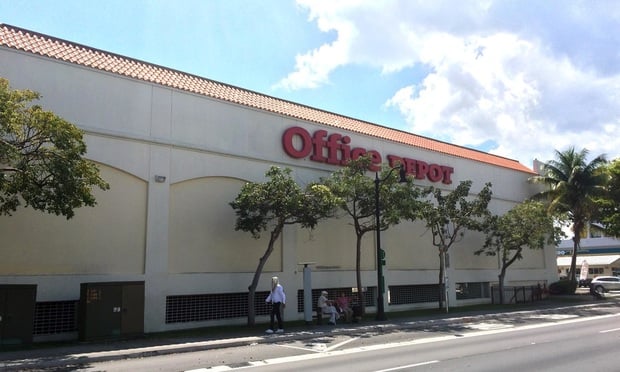FTC Settlement: Heeding Employees' Concerns Could Have Saved Office Depot $25M
Boca Raton, Florida-based Office Depot Inc. and its subsidiary Support.com agreed to pay $25 million and $10 million, respectively, to settle allegations that they tricked customers into spending millions of dollars on repairs by deceptively claiming that they had found malware symptoms or infections on consumers' computers, an alleged scheme first flagged by store employees, the FTC said.
March 28, 2019 at 03:57 PM
4 minute read
 An Office Depot in Miami. Photo by AM Holt
An Office Depot in Miami. Photo by AM Holt
The Federal Trade Commission has a message for general counsel and their companies stemming from a recent settlement with Office Depot: Don't ignore employees' concerns about questionable business practices.
Boca Raton, Florida-based Office Depot Inc. agreed to pay $25 million to settle allegations that the office supply retailer tricked customers into spending millions of dollars on repairs by deceptively claiming it had found malware symptoms or infections on consumers' computers. Support.com, which is owned by Office Depot, agreed to pay another $10 million for its role in the alleged scheme, which, according to the FTC, was first flagged by store employees.
Office Depot executive vice president, chief legal and administrative officer and corporate secretary David Bleisch, who joined the company in the fall of 2017, was not available for comment on Thursday. A Support.com representative did not immediately respond to an emailed request for comment.
In an emailed statement, an Office Depot representative said the settlement resolves an investigation into a computer diagnostic system that was offered to Office Depot and OfficeMax customers before December 2016 and that the $25 million is “to provide equitable relief for affected customers.”
“While Office Depot does not admit to any wrongdoing regarding the FTC's allegations, the company believes that the settlement is in its best interest in order to avoid protracted litigation,” according to the statement.
Office Depot, under the terms of the agreement, also is required to provide regular compliance reports, create and retain certain records, and submit to compliance monitoring.
William MacLeod of Kelley Drye & Warren, along with Katrina Lindsey, senior vice president and deputy GC at Office Depot, represented the company in the case. Claire Wack, Sung Kim, Colleen Robbins and Thomas Biesty represented the FTC, the legal department of which is overseen by GC Alden Abbott.
Since at least 2009, according to the complaint, Support.com provided Office Depot with software called PC Health Check that offered, via advertising in Office Depot stores, on the radio and in print publications, free PC checkups.
When consumers were in the store, employees allegedly installed the software program on their computers in their presence. The defendants, however, had configured the PC Health Check program to report that the scan had found malware symptoms, even in the absence of such, via a pop-box that asked the consumer to identify if the computer had any of four generic symptoms, the FTC said.
Despite the emergence of complaints by store employees beginning in 2012, Office Depot allegedly told employees to continue advertising the service and to continue to run the program on consumers' computers, and paid extra commissions to store managers and employees who met their weekly goals for PC Health Check runs and tech service sales while reproaching those who did not.
It wasn't until a Seattle television station in late 2016 aired a segment reporting that Office Depot stores were claiming to detect malware on brand-new computers that the company suspended the program, the FTC said.
In providing lessons from the case, the agency noted that “clarity begins at home,” adding “when employees express concern about a questionable business practice, savvy executives pay attention. Heeding in-house early warnings and responding appropriately may be able to prevent a more serious predicament.”
Other tips from the agency include a reminder that service promises, not just product claims, are subject to the FTC act and that it's “unwise” for companies to exploit consumers' fears about computer security falsely for their own economic benefit.
This content has been archived. It is available through our partners, LexisNexis® and Bloomberg Law.
To view this content, please continue to their sites.
Not a Lexis Subscriber?
Subscribe Now
Not a Bloomberg Law Subscriber?
Subscribe Now
NOT FOR REPRINT
© 2025 ALM Global, LLC, All Rights Reserved. Request academic re-use from www.copyright.com. All other uses, submit a request to [email protected]. For more information visit Asset & Logo Licensing.
You Might Like
View All

Riding High, Texas Roadhouse Gives Legal Chief 3-year Contract Extension,15% Salary Boost
2 minute read
'Be Comfortable Being Uncomfortable': Pearls of Wisdom From 2024 GC Q&As

Trending Stories
Who Got The Work
J. Brugh Lower of Gibbons has entered an appearance for industrial equipment supplier Devco Corporation in a pending trademark infringement lawsuit. The suit, accusing the defendant of selling knock-off Graco products, was filed Dec. 18 in New Jersey District Court by Rivkin Radler on behalf of Graco Inc. and Graco Minnesota. The case, assigned to U.S. District Judge Zahid N. Quraishi, is 3:24-cv-11294, Graco Inc. et al v. Devco Corporation.
Who Got The Work
Rebecca Maller-Stein and Kent A. Yalowitz of Arnold & Porter Kaye Scholer have entered their appearances for Hanaco Venture Capital and its executives, Lior Prosor and David Frankel, in a pending securities lawsuit. The action, filed on Dec. 24 in New York Southern District Court by Zell, Aron & Co. on behalf of Goldeneye Advisors, accuses the defendants of negligently and fraudulently managing the plaintiff's $1 million investment. The case, assigned to U.S. District Judge Vernon S. Broderick, is 1:24-cv-09918, Goldeneye Advisors, LLC v. Hanaco Venture Capital, Ltd. et al.
Who Got The Work
Attorneys from A&O Shearman has stepped in as defense counsel for Toronto-Dominion Bank and other defendants in a pending securities class action. The suit, filed Dec. 11 in New York Southern District Court by Bleichmar Fonti & Auld, accuses the defendants of concealing the bank's 'pervasive' deficiencies in regards to its compliance with the Bank Secrecy Act and the quality of its anti-money laundering controls. The case, assigned to U.S. District Judge Arun Subramanian, is 1:24-cv-09445, Gonzalez v. The Toronto-Dominion Bank et al.
Who Got The Work
Crown Castle International, a Pennsylvania company providing shared communications infrastructure, has turned to Luke D. Wolf of Gordon Rees Scully Mansukhani to fend off a pending breach-of-contract lawsuit. The court action, filed Nov. 25 in Michigan Eastern District Court by Hooper Hathaway PC on behalf of The Town Residences LLC, accuses Crown Castle of failing to transfer approximately $30,000 in utility payments from T-Mobile in breach of a roof-top lease and assignment agreement. The case, assigned to U.S. District Judge Susan K. Declercq, is 2:24-cv-13131, The Town Residences LLC v. T-Mobile US, Inc. et al.
Who Got The Work
Wilfred P. Coronato and Daniel M. Schwartz of McCarter & English have stepped in as defense counsel to Electrolux Home Products Inc. in a pending product liability lawsuit. The court action, filed Nov. 26 in New York Eastern District Court by Poulos Lopiccolo PC and Nagel Rice LLP on behalf of David Stern, alleges that the defendant's refrigerators’ drawers and shelving repeatedly break and fall apart within months after purchase. The case, assigned to U.S. District Judge Joan M. Azrack, is 2:24-cv-08204, Stern v. Electrolux Home Products, Inc.
Featured Firms
Law Offices of Gary Martin Hays & Associates, P.C.
(470) 294-1674
Law Offices of Mark E. Salomone
(857) 444-6468
Smith & Hassler
(713) 739-1250






